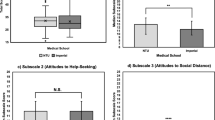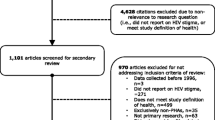Abstract
Individuals with mental illnesses are often stigmatized by healthcare professionals and students, shaping the quality of care that such clients receive. This study examines the knowledge, attitudes, and behavioural responses of healthcare professionals and students toward individuals with mental illnesses. The seven-phase meta-ethnography was utilized to complete this study: getting started, deciding relevance, reading the studies, determining how the studies are related, translating the studies into one another, synthesizing translations, and expressing the synthesis. The meta-synthesis yielded five core themes. Two themes described insight into positive and negative perceptions and behaviours of healthcare professionals and students toward individuals with mental illnesses. Three themes addressed the factors, including insufficiencies in the healthcare system, contact experiences, and other biological and social influences, that impact the perceptions and behaviours. Understanding these humiliating perceptions and behaviours and the factors that shape them is the first step toward diminishing mental health stigma in the healthcare system.


Similar content being viewed by others
References
Knaak S, Mantler E, Szeto A. Mental illness-related stigma in healthcare: barriers to access and care and evidence-based solutions. Healthcare Manag Forum. 2017;30:111–6. https://doi.org/10.1177/0840470416679413.
Ogunsemi, O. O., Odusan, O., & Olatawura, M. O. (2008). Stigmatising attitude of medical students toward a psychiatry label. Ann Gen Psychiatry, 7(15). doi: https://doi.org/10.1186/1744-859X-7-15.
Mukherjee R, Fialho A, Wijetunge A, Checinski K, Surgenor T. The stigmatization of psychiatric illness: the attitudes of medical students and doctors in a London teaching hospital. Psychiatrist. 2002;26:178–81. https://doi.org/10.1192/pb.26.5.178.
Riffel T, Chen S-P. Exploring the knowledge, attitudes, and behavioural responses of healthcare students towards mental illnesses – a qualitative study. Int J Environ Res Public Health. 2020;17(1):25. https://doi.org/10.3390/ijerph17010025.
Stuber JP, Rocha A, Christian A, Link BG. Conceptions of mental illness: attitudes of mental health professionals and the general public. Psychiatr Serv. 2014;65:491–7. https://doi.org/10.1176/appi.ps.201300136.
Connaughton J, Gibson W. Physiotherapy students’ attitudes toward psychiatry and mental health: a cross-sectional study. Physiother Can. 2016;68:172–8. https://doi.org/10.3138/ptc.2015-18E.
Ahmedani, B. K.. Mental health stigma: Society, individuals, and the profession. J Social Work Val Ethics. 2011; 8. Retrieved from: https://www.ncbi.nlm.nih.gov/pmc/articles/PMC3248273/
Campbell, R., Pound, P., Morgan, M., Daker-White, G., Britten, N, Pill, R., Yardley, L. & Donovan, J.. Evaluating meta-ethnography: systematic analysis and synthesis of qualitative research. Health Technol Assess. 2011; 15 43. doi: https://doi.org/10.3310/hta15430.
Martin N, Johnston V. A time for action: tackling stigma and discrimination. Ottawa: Mental Health Commission of Canada; 2007.
Arboleda-Florez, J.. The rights of a powerless legion. In J. Arboleda-Florez, & Sartorius, N. (Eds.), Understanding the stigma of mental illness. John Wiley & Sons, Ltd.; 2008.
Corrigan PW, Watson AC. The paradox of self-stigma and mental illness. Clin Psychol Sci Pract. 2002;9:35–53.
Link BG, Phalen JC. Conceptualizing stigma. Annu Rev Sociol. 2001;27:363–85 Retrieved from: https://www.annualreviews.org/doi/full/10.1146/annurev.soc.27.1.363.
Corrigan PW, River LP, Lundin RK, Penn DL, Uphoff-Wasowski K, Campion J, et al. Three strategies for changing attributions about severe mental illness. Schizophr Bull. 2001;27:187–95. https://doi.org/10.1093/oxfordjournals.schbul.a006865.
Corrigan PW. Mental health stigma as social attribution: implications for research methods and attitude change. Clin Psychol Sci Pract. 2000;7:48–67.
Weiner B, Perry RP, Magnusson J. An attributional analysis of reactions to stigmas. J Pers Soc Psychol. 1988;55:738–48.
Thornicroft G, Rose D, Kassam A, Sartorius N. Stigma: Ignorance, prejudice or discrimination? Br J Psychiatry. 2007;190:192–3. https://doi.org/10.1192/bjp.bp.106.025791.
Noblit, G. W., & Hare, R. D. (1999. Chapter 5: Meta-ethnography: synthesizing qualitative studies. Counterpoints, 44, 93–123. Retrieved from: https://www.jstor.org/stable/i40115610.
Atkins S, Lewin S, Smith H, Engel M, Fretheim A, Volmink J. Conducting a meta-ethnography of qualitative literature: lessons learnt. BMC Med Res Methodol. 2008;8:1–10. https://doi.org/10.1186/1471-2288-8-21.
World Health Organization (2013). Transforming and scaling up health professionals’ education and training: World health organization guidelines 2013. Retrieved from: https://www.ncbi.nlm.nih.gov/books/NBK298953/pdf/Bookshelf_NBK298953.pdf
Government of Canada. (n.d.). Mental illness. Retrieved from: https://www.canada.ca/en/public-health/services/chronic-diseases/mental-illness.html
Britten N, Campbell R, Pope C, Donovan J, Morgan M, Pill R. Using meta ethnography yo synthesise qualitative research: a worked example. J Health Serv Res Policies. 2002;7:200–15.
Kinn LG, Tanaka K, Bellamy C, Davidson L. “Pushing the boat out”: a Meta-synthesis of how members, staff and family experience the clubhouse model. Community Ment Health J. 2018;54:1199–211.
Zimmer L. Qualitative meta-synthesis: a question of dialoguing with texts. J Adv Nurs. 2006;53:311–8.
Caplan S, Little TV. Stigma about mental illness among multidisciplinary health care providers in Dominican Republic. Int Perspect Soc: Res, Pract, Consultation. 2016;5:192–206. https://doi.org/10.1037/ipp0000057.
Camuccio CA, Chambers M, Välimäki M, Farro D, Zanotti R. Managing distressed and disturbed patients: the thoughts and feelings experienced by Italian nurses. J Psychiatr Ment Health Nurs. 2012;19:807–15. https://doi.org/10.1111/j.1365-2850.2011.01857.
Chambers M, Kantaris X, Guise V, Valimaki M. Managing and caring for distressed and disturbed services users: the thoughts and feelings experienced by a sample of English mental health users. J Psychiatr Ment Health Nurs. 2015;22:289–97. https://doi.org/10.1111/jpm.12199.
Crowe A, Averett P. Attitudes of mental health professionals toward mental illness: a deeper understanding. J Ment Health Couns. 2015;37:47–62. https://doi.org/10.17744/mehc.37.1.l23251h783703q2v.
Goldstone, D., & Bantjes, J. (2017). Mental health care providers’ perceptions of the barriers to suicide prevention amongst people with substance use disorders in South Africa: A qualitative study. Int J Mental Health Syst, 11(46). doi: https://doi.org/10.1186/s13033-017-0153-3.
Jarrett P. Attitudes of student midwives caring for women with perinatal mental health problems. Br J Midwifery. 2014;22:718–24. https://doi.org/10.12968/bjom.2014.22.10.718.
Katakura N, Yamamoto-Mitani N, Ishigaki K. Home-visit nurses’ attitudes for providing effective assistance to clients with schizophrenia. Int J Ment Health Nurs. 2010;19:102–9. https://doi.org/10.1111/j.1447-0349.2009.00641.
Loeb DF, Bayliss EA, Binswanger IA, Candrian C, deGruy FV. Primary care physician perceptions on caring for complex patients with medical and mental illness. Soc Gen Int Med. 2012;27:945–52. https://doi.org/10.1007/s11606-012-2005-9.
Luo A, He H, Mohamed S, Rosenheck R. Medical student attitudes toward people with mental illness in China: a qualitative study. Cult Med Psychiatry. 2018;42:535–51. https://doi.org/10.1007/s11013-018-9568-9.
Medina, C. O., Kullgren, G., & Dahlblom, K.. A qualitative study on primary health care professionals’ perceptions of mental health suicidal problems and help-seeking among young people in Nicaragua. BMC Fam Pract. 2014, 15 129. doi: https://doi.org/10.1186/1471-2296-15-129.
Morgan BD. Nursing attitudes toward patients with substance use disorders in pain. Pain Manag Nurs. 2014;15:165–75. https://doi.org/10.1016/j.pmn.2012.08.004.
Morgan BD. “No right place to die”: nursing attitudes and needs in caring for people with serious mental illness at end-of-life. J Am Psychiatr Nurses Assoc. 2016;22:31–42. https://doi.org/10.1177/1078390316629960.
Zolnierek CD, Clingerman EM. A medical-surgical nurse’s perceptions of caring for a person with severe mental illness. J Am Psychiatr Nurses Assoc. 2012;18:226–35. https://doi.org/10.1177/1078390312446223.
Waugh W, Lethem C, Sherring S, Hendersen C. Exploring experiences of and attitudes toward mental illness and disclosure amongst health care professionals: a qualitative study. J Ment Health. 2017;26:457–63. https://doi.org/10.1080/09638237.2017.1322184.
Tognazzini, P., Davis, C., Kean, A., Osborne, M., & Wong, K. K. (2008). Reducing the stigma of mental illness. Can Nurse, 104, 30–33. Retrieved from: https://www.ncbi.nlm.nih.gov/pubmed/18979863.
Stuart, H., Koller, M., & Armstrong, A. W. (2014). Opening minds in a post-secondary environment: Results of an online contact-based anti-stigma intervention. Retrieved from https://www.algonquincollege.com/faculty-module-csd/files/2014/04/AC-Research-Results-MHCC.pdf
Chen S-P, Koller M, Krupa T, Stuart H. Contact in the classroom: developing a program model for youth mental health contact-based anti-stigma education. Community Ment Health J. 2016;52:281–93.
Patten, S. B., Remillard, A., Phillips, L., Modgill, G., Szeto, A. C. H., Kassam, A., & Gardner, D. M.. Effectiveness of contact-based education for reducing mental illness-related stigma in pharmacy students. BMC Med Educ. 2012, 12. doi: https://doi.org/10.1186/1472-6920-12-120.
Availability of Data and Material
Not applicable.
Author information
Authors and Affiliations
Contributions
This is part of T.R.’s Master’s thesis. Both authors have equal contributions to the study: conceptualization, T.R. and S.C.; methodology, S.C.; literature search, T. R.; data analysis, T.R. and S.C.; writing—original draft preparation, T.R.; writing—review and editing, S.C.; supervision, S.C.
Corresponding author
Ethics declarations
Conflict of Interest
The authors declare that they have no conflict of interest.
Ethics Approval
Not applicable.
Consent to Participate
Not applicable.
Code Availability
Not applicable.
Additional information
Publisher’s Note
Springer Nature remains neutral with regard to jurisdictional claims in published maps and institutional affiliations.
Rights and permissions
About this article
Cite this article
Riffel, T., Chen, SP. Stigma in Healthcare? Exploring the Knowledge, Attitudes, and Behavioural Responses of Healthcare Professionals and Students toward Individuals with Mental Illnesses. Psychiatr Q 91, 1103–1119 (2020). https://doi.org/10.1007/s11126-020-09809-3
Published:
Issue Date:
DOI: https://doi.org/10.1007/s11126-020-09809-3




